Hill panel probing opioids abuse targets distributor firms

Congressional investigators say wholesale pharmaceutical distributors shipped hundreds of millions of prescription opioid pills to West Virginia, a state disproportionately ravaged by deaths caused by the addictive drugs. Now, lawmakers want executives of those companies to explain how that happened. Current and former officials from five distributor companies are set to give sworn testimony on the subject Tuesday to a House subcommittee. Their appearances come during an election-year push by Congress to pass largely modest legislation aimed at curbing a growing epidemic that saw nearly 64,000 people die last year from drug overdoses, with two-thirds of those deaths involving opioids. The House Energy and Commerce Committee began investigating the distribution of prescription opioids last May. The panel has said distributors sent more than 780 million pills of hydrocodone and oxycodone — prescription pain-killers that have caused many overdose deaths — to West Virginia from 2007 to 2012. That’s an average of more than 400 pills per person over that period in the state, where around 1.8 million people live. Investigators said 20.8 million opioid pills were shipped from 2006 to 2016 to Williamson, population 2,900. One pharmacy in Kermit, with around 400 residents, ranked 22nd in the U.S. in the number of hydrocodone pills it received in 2006, according to the investigation. West Virginia had the nation’s highest drug overdose death rate of 52 per 100,000 in 2016, according to federal figures. Other states with high death rates included Ohio, Pennsylvania and New Hampshire, as well as Washington, D.C. Nearly 12 million people misused opioids in 2016, according to federal figures. Executives slated to testify included top officials from Cardinal Health Inc., AmerisourceBergen Corp. and McKesson Corp., the nation’s three biggest wholesale drug distributors. The executives were appearing before the Energy and Commerce committee’s oversight and investigations subcommittee. The government requires distributors of controlled substances to report suspicious drug orders to the federal Drug Enforcement Administration and to deny questionable transactions. The Trump administration and lawmakers of both parties have been drawing attention to opioids, a range of pain-killing drugs that can be addictive when misused. They include prescription drugs like hydrocodone, oxycodone and codeine, synthetic opioids like fentanyl that can be made illegally, and illegal drugs like heroin. The Energy and Commerce panel has been working on dozens of bills that include encouraging doctors to use non-addictive pain killers, spurring research on such products, broadening access to treatment and giving financial incentives for drug treatment specialists to work in underserved areas. Senate committees are working on their own legislation. The setting was reminiscent of 1994 hearings at which executives of the nation’s tobacco companies testified before the Energy and Commerce panel, then controlled by Democrats. The officials said they didn’t believe cigarettes were addictive, despite evidence to the contrary. Four years later, the industry reached a settlement to pay the states more than $200 billion over 25 years to reimburse them for tobacco-related health care costs. Republished with permission from the Associated Press.
Bradley Byrne: Making Congress work again
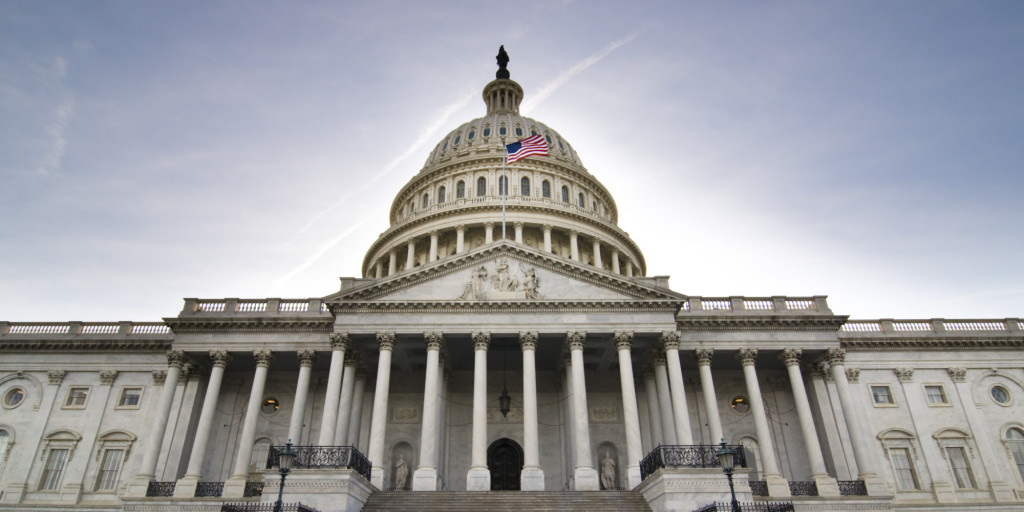
Anyone who has followed Congress over the last twenty years knows that things have been pretty dysfunctional. While I believe our Founding Fathers intended for the Legislative Branch to be deliberative, I think they would be troubled by how broken things have become. One of the top drivers of the dysfunction is the budget and government funding process. Did you know that the last time Congress passed a budget and all twelve government funding bills on time was 1994? Instead, we have found ourselves in a very dangerous cycle of governing from one funding crisis to the next. At the same time, two-thirds of federal spending is on autopilot as the national debt and federal spending continues to grow. We must do better. I am tired of just talking about how the process is broken. We need less talk and more solutions, so I introduced the Protecting Our Children’s Future Act. I chose this title because getting our budgeting and spending right really is all about the future of our country. Our legislation reforms the Congressional budget process to make things work again. Just as important, it lays out a process that would make it easier to cut spending and reduce the deficit. First, our bill moves to a biennial budget timeline. This means that the budget and funding bills would cover two years instead of just one. This would allow Congressional committees to spend more time overseeing how money is spent, and it will create fewer opportunities for budgetary holdups. Second, the bill subjects all government funding bills to the reconciliation process. This would result in just a 51-vote majority being needed for passage in the Senate if funding bills stay within the budget. President Donald Trump has proposed some major cuts to federal spending over the last two budget cycles. Unfortunately, Democrats have held many of these cuts hostage with a filibuster. Our bill would end this practice. Third, our bill puts in place a “No Budget, No Pay” provision for all Members of Congress. Members of Congress would not be paid until a budget passed out of the House and Senate. American families must have a budget. If Congress fails to do so, then we should not be paid. Fourth, we need a budget timeline that more accurately reflects the calendar. For example, the current time frame expects a newly elected President to submit their budget proposal right after being sworn in. Instead of the fiscal year beginning in October, we would start the calendar on January 1 each year. Our bill would make the process much more realistic and simplistic. Fifth, the bill shifts most mandatory spending to discretionary. This would take all spending other than Social Security retirement benefits, Medicare, TRICARE, and veteran programs off autopilot. Congress cannot do its most important job to allocate federal resources if two-thirds of the budget is outside the spending process. Finally, the bill moves to zero-based budgeting. All programs and expenditures would have to be justified by agencies from the ground up at the beginning of each budget cycle. No longer would a program or agency be assumed an automatic increase. Every taxpayer dollar would have to be justified. If you are like me, you probably think these changes sound pretty commonsense. Well, they are. We need to stop making things so confusing and complicated and just use a little more commonsense. By doing so, we can rein in federal spending, reduce the national debt, and create a more efficient federal government. I urge my colleagues on both sides of the aisle to support the Protecting Our Children’s Future Act, and let’s make Congress work again. • • • Bradley Byrne is a member of U.S. Congress representing Alabama’s 1st Congressional District.
Bradley Byrne: How we fund the government

Arguably, Congress’s most important power is the power of the purse. Through funding bills, Congress has an important opportunity to set the direction of the government. Founding Father James Madison called it “the most complete and effectual weapon with which any constitution can arm the immediate representatives of the people”. Unfortunately, in recent years, Congress has failed at this basic constitutional responsibility. For far too long, Congress has operated from manufactured crisis to manufactured crisis, putting off passing government funding bills until the last possible minute. Even worse, Congress has also fallen into a bad habit of just passing short-term spending bills known as Continuing Resolutions (CR) that simply hold federal spending in place. This is exactly what happened just a few weeks ago. I voted against that bill because it’s unacceptable to operate the government in that manner. Fortunately, for the first time since 2009, the House last week passed all twelve of the individual government funding bills before the end of the fiscal year on September 30th. Only in Washington would simply doing your job be considered a major accomplishment, but this was a big breakthrough in the government funding process and it is important to enacting President Trump’s agenda. For example, our funding bills crack down on illegal immigration and fully fund President Donald Trump’s request for the border wall. The bills also roll back burdensome regulations, provide a raise to our troops, defund Planned Parenthood, cut funds to the IRS and EPA, and boost funding for medical research. While I am proud we got the job done, we still have a lot of work to do. For example, Congress has still not even passed a budget for Fiscal Year 2018 yet, and the Senate has yet to consider even a single funding bill. I want to take a minute to clarify the difference between the federal budget and the funding bills. While the terms are often interchanged, they are actually very different. The budget is more of an aspirational document that does not carry the force of law, but it serves as a blueprint for the funding bills. Even more, the budget submitted each year by the President is truly just a recommendation that Congress uses to draft our own budget. Even still, the budget is important because it sets topline spending levels and provides a more long-term budget outlook. The funding bills are where the money is actually spent. These are very specific bills that lay out line item appropriations for most government agencies and programs. The funding bills run on the fiscal year calendar, so from October 1st to September 30th each year. If the funding bills are not passed before September 30th, a government shutdown occurs. When the process works like it is supposed to, the president submits his budget request in February, the House and Senate pass budget resolutions by the middle of the year, and then pass the twelve individual funding bills by September 30th. We must return to this process. When the system is broken, as it currently is, it makes it much harder to set federal priorities and cut down on wasteful or unnecessary government programs. This is why I think it is so important we return to regular order and get our work done on time. I understand it is difficult to make spending decisions in today’s tight budget environment, but the American people elected us to make difficult choices. While I’m glad the House got our work done this year, we must keep pushing to fix the overall process and restore fiscal sanity in Washington. • • • Bradley Byrne is a member of U.S. Congress representing Alabama’s 1st Congressional District.
House backs $1.2T spending bill with more money for military

The Republican-led House on Thursday passed a sweeping $1.2 trillion spending bill that provides billions more dollars for the military while sparing medical research and popular community development programs from deep cuts sought by President Donald Trump. The vote was 211-198 for the massive measure that wrapped the 12 annual spending bills into one in advance of the end of the budget year on Sept. 30. Even though the Senate still must act, the government will keep operating through Dec. 8, thanks to legislation Congress passed last week and sent to Trump. House members spent the past two weeks debating the measure’s $500 billion for domestic agencies. GOP leaders then merged that domestic spending package with an earlier House measure that would give record budget increases to the Pentagon and provide a $1.6 billion down payment for Trump’s wall along the U.S.-Mexico border that he repeatedly has insisted Mexico would finance. “It does everything from strengthening our national defense and veterans’ programs to cracking down on illegal immigration to protecting life to cutting abusive Washington agencies like the IRS and the EPA,” said the No. 2 House Republican, Rep. Kevin McCarthy of California. At issue are the spending bills passed by Congress each year to fund day-to-day operations of federal agencies. Trump, following the lead of budget director Mick Mulvaney, a former tea party congressman, pushed for a sweeping increase for the Pentagon and commensurate cuts of more than $50 billion from domestic agencies and foreign aid. House Republicans have responded by adding even more spending on defense, but have significantly scaled back Trump’s cuts to domestic programs like community development grants and medical research. Trump has taken a low-profile on budget issues other than the wall, however, and his administration has done little to fight for his spending cuts since they were unveiled. The House measure adds almost $9 billion to Trump’s funding request for medical research at the National Institutes of Health, rather than accepting sharp cuts recommended by Trump. It keeps as-is a $269 million subsidy for money-losing routes to rural airports that Trump had targeted. And it gives modest increases to GOP favorites such as law enforcement agencies and NASA. But House Republicans voted to slash government accounts on studying climate change, eliminate Title X family planning funds, and sharply cut foreign aid accounts, though not as drastically as Trump proposed. A transportation grant program started by former President Barack Obama would be eliminated, as would hiring grants for local police departments. The limits imposed by a budget agreement threaten the measure’s sweeping Pentagon increases, which total about $60 billion above current levels and almost $30 billion higher than Trump’s budget. That would evaporate next year unless there’s a bipartisan agreement to raise them. A two-year agreement that eased those spending limits expires in September. The legislation is laced with conservative provisions reversing Obama-era regulations, blocking implementation of the Affordable Care Act and defunding Planned Parenthood. But most such measures will be dropped – as in previous years – during subsequent negotiations with Democrats. Passage of the legislation marks the first time since 2009 that the House has backed all of the appropriations bills in one fashion or the other by the end of the budget year. The progress was possible in part because House GOP leaders maneuvered to keep Democrats from forcing controversial votes on issues such as immigration. Republished with permission from the Associated Press.
House moving swiftly on $7.9B Harvey relief bill

The House on Wednesday moved swiftly toward approving $7.9 billion in Harvey disaster relief as Democratic leaders signaled they would back the measure along with a short-term increase in the nation’s borrowing limit to avoid an economy-rattling default. The announcement by House Minority Leader Nancy Pelosi, D-Calif., and Senate Minority Leader Chuck Schumer of New York is aimed at retaining Democratic influence and trying to ensure the Republican-controlled Congress addresses health care and immigration as the hectic fall agenda kicked off. “Given Republican difficulty in finding the votes for their plan, we believe this proposal offers a bipartisan path forward to ensure prompt delivery of Harvey aid as well as avoiding a default, while both sides work together to address government funding, DREAMERS, and health care,” Pelosi and Schumer wrote. Democratic votes are needed to quickly pass a debt limit increase, even though Republicans control Congress. Many Republicans simply won’t vote to increase the debt limit without cuts elsewhere in government spending. Wednesday’s House vote comes as the government’s response to Harvey is draining existing disaster reserves, with Federal Emergency Management Agency‘s disaster accounts hovering at $1 billion or less. FEMA is warning lawmakers that disaster funds run out on Friday, even as a much more powerful hurricane, Irma, is bearing down on the eastern U.S. This week’s measure is to handle the immediate emergency needs and replenish reserves in advance of Irma. Far more money will be needed once more complete estimates are in this fall, and Harvey could end up exceeding the $110 billion government cost of Hurricane Katrina. The move by Pelosi and Schumer is aimed at winning assurances that minority party Democrats will be treated fairly as Congress advances through its daunting to-do list, which includes extending a popular children’s health program, federal flood insurance, and, perhaps, a budget that would ease tight limits on Pentagon and domestic spending. The statement came out as the House Wednesday took up a $7.9 billion request by President Donald Trump‘s for a $7.9 billion first installment of relief for victims of Harvey. House action on Wednesday would set up a Senate debate that, as of Wednesday, would follow an uncertain path. GOP leaders have signaled that they want to use the urgent Harvey aid bill to solve perhaps the most vexing issue facing Congress this month: Increasing the U.S. debt limit make sure the government can borrow freely again to cover its bills, including Harvey aid. Senate Majority Leader Mitch McConnell, R-Ky., said again Wednesday that increased Harvey costs show the importance of acting swiftly to increase the government’s debt cap to make sure there’s enough borrowed cash to pay out the surge in disaster aid. “I think it’s a terrible idea,” said House Freedom Caucus Chairman Mark Meadows, R-N.C., who conceded that conservatives were getting outmaneuvered. “I think at this point there are bigger issues that we have to focus on,” Meadows said. “I have opposed a debt ceiling increase every time it has come up for a vote,” said Rep. Roger Williams, R-Texas. “I am heavily opposed to lumping these two separate issues together.” Analysts at the Bipartisan Policy Center, a Washington think tank, say Harvey aid wouldn’t cause a cash crunch for weeks. “We’re dealing with all these things at this point in time anyway,” said House Democratic Caucus Chairman Joe Crowley of New York. “Democrats have said we’re for a clean debt ceiling and we’re also for making sure the people from Texas, Louisiana, and elsewhere who’ve been severely damaged by these storms – with one more on the way as well – that their needs need to be addressed as well.” Republished with permission from the Associated Press.
Harvey aid, debt on returning Congress’ daunting to-do list
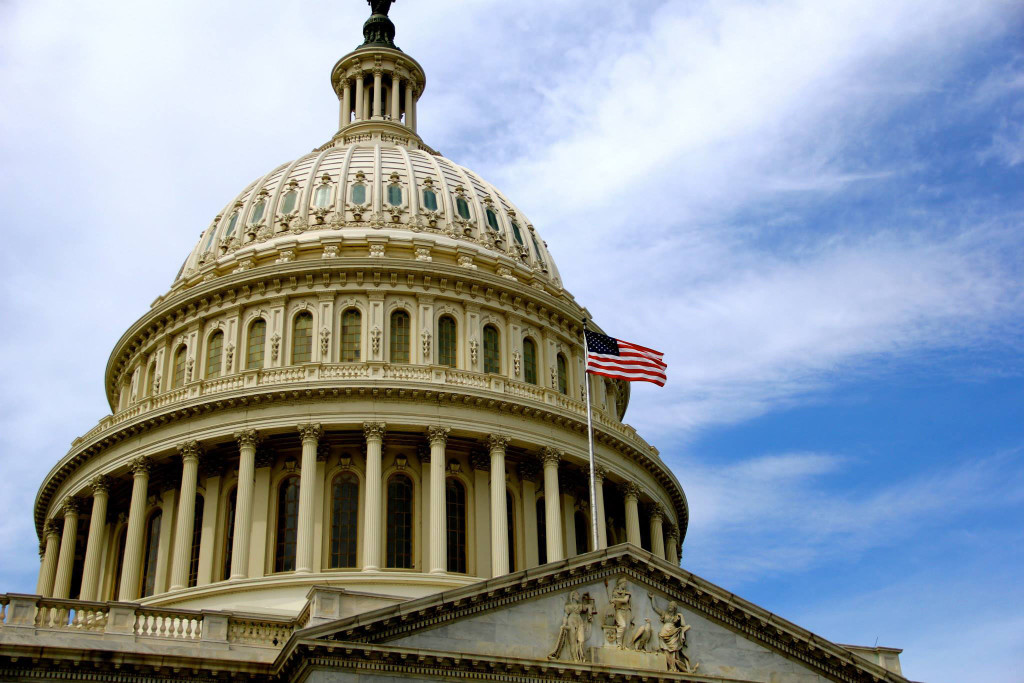
Congress ends its five-week summer recess Tuesday as storm-ravaged states clamor for Harvey aid, the Trump administration demands a swift increase in the nation’s borrowing authority, and President Donald Trump‘s actions on immigration seem certain to upend the fall agenda. Lawmakers face a daunting workload and fast-approaching deadlines, including the need to fund the government and increase the United States’ $19.9 trillion debt ceiling by month’s end. A Republican-led Congress with no major legislative achievement in the first seven months of Trump’s presidency also is intent on overhauling the nation’s tax code, hoping for a political win after the failure of repealing and replacing Barack Obama‘s health care law. The immediate focus will be rushing a $7.9 billion disaster relief package to Harvey victims. Treasury Secretary Steve Mnuchin raised the stakes last weekend by calling on Congress to combine the aid with a contentious increase in the nation’s borrowing limit. Conservatives oppose raising the borrowing limit without getting something in exchange, such as deep cuts elsewhere in federal spending. “The president and I believe that it should be tied to the Harvey funding,” Mnuchin said Sunday. “If Congress appropriates the money, but I don’t have the ability to borrow more money and pay for it, we’re not going to be able to get that money to the state. So, we need to put politics aside.” The House and Senate are expected to vote quickly on the first $7.9 billion aid installment to help with immediate recovery and rebuilding needs in Houston and beyond. Additional billions will be tucked into a catchall spending bill later in the month that will keep the lights on in government past Sept. 30, when the current budget year ends. “Somebody who’s just been pulled off their roof doesn’t want to hear about our internecine squabbles and debates over procedure when they’ve lost their homes and are trying to figure out where they’re going to sleep the next night,” said Rep. Charlie Dent, R-Pa. Swift action on Harvey will give Congress and Trump the chance to look competent and remind voters that government can be a positive force. GOP lawmakers head into the final quarter of the year desperate to notch accomplishments and make headway on a sweeping tax overhaul, and the majority party is eager for the chance to turn around its dreary track record ahead of next year’s midterm elections. Trump may toss another tricky issue Congress’ way. The president was expected to announce that he will end protections for young immigrants who were brought into the country illegally as children, but with a six-month delay. The postponement in the formal dismantling of the Deferred Action for Childhood Arrivals, or DACA, program would be intended to give Congress time to address the issue. But it was unclear whether it could resolve the problem given that it has had several failures in attempts to enact comprehensive immigration reform. Some Republicans, led by House Speaker Paul Ryan, R-Wis., have urged Trump not to end the program and save nearly 800,000 from threat of deportation. Adding to the pile of work, a few important programs are expiring at the end of September and need to be renewed. They include children’s health insurance payments and a national federal flood insurance program that has bipartisan support but continually pays out more than it takes in through premiums. Republished with permission from the Associated Press.
GOP voters blame Congress, not Donald Trump, for lack of progress
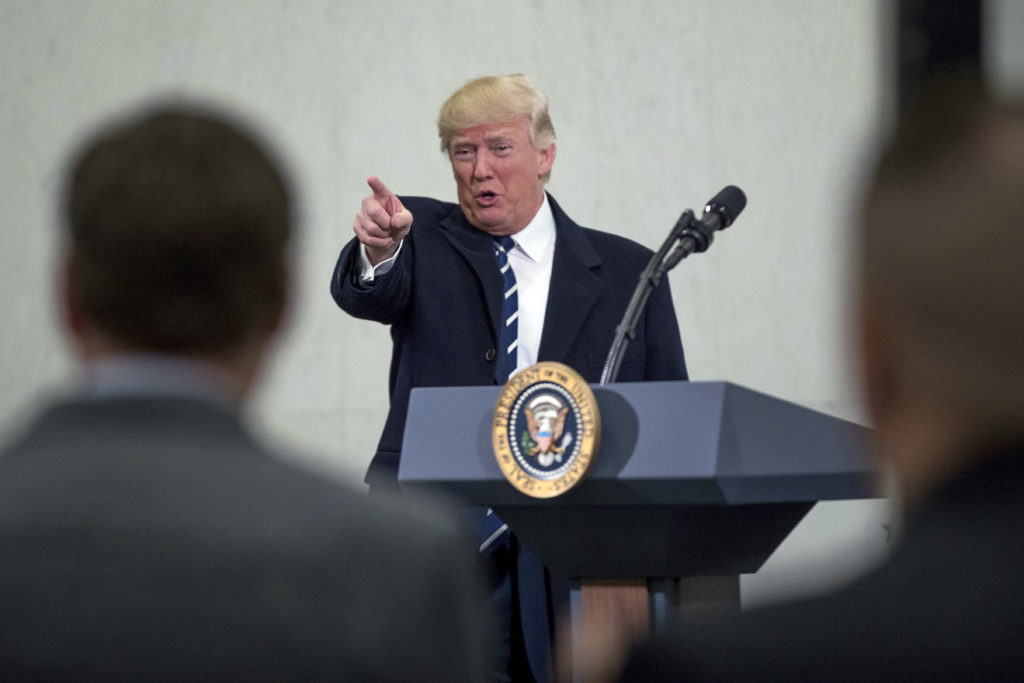
In firm control of the federal government, President Donald Trump and his Republican Party have so far failed to deliver on core campaign promises on health care, taxes and infrastructure. But in New York’s Trump Tower cafe, the Gentry family blames Congress, not the president. Like many Trump voters across America, the Alabama couple, vacationing last week with their three children, says they are deeply frustrated with the president’s GOP allies, faulting them for derailing Trump’s plans. As the family of five lunched in Trump Tower, Sheila Gentry offered a pointed message to those concerned with the GOP’s ability to govern five months into the Trump presidency. “Shut up. Get on board. And let’s give President Trump the benefit of the doubt. It takes a while,” said the 46-year-old nursing educator from Section, Alabama. “They just need a good whoopin’,” said her husband, Travis Gentry, a 48-year-old engineer, likening congressional infighting to unruly kids in the back seat of the car. As Washington Republicans decry Trump’s latest round of Twitter attacks, Republicans on the ground from New York to Louisiana to Iowa continue to stand by the president and his unorthodox leadership style. For now at least, rank-and-file Republicans are far more willing to blame the GOP-led Congress for their party’s lack of progress, sending an early warning sign as the GOP looks to preserve its House and Senate majorities in next year’s midterm elections. Inside and outside the Beltway surrounding the nation’s capital, Republicans worry their party could pay a steep political price unless they show significant progress on their years-long promise to repeal and replace Democrat Barack Obama‘s health care law. Even more disturbing, some say, is the Republican Party’s nascent struggle to overhaul the nation’s tax system, never mind Trump’s unfulfilled vows to repair roads and bridges across America and build a massive border wall. “It’s a problem for Republicans, who were put in place to fix this stuff. If you can’t fix it, I need someone who can,” said Ernie Rudolph, a 72-year-old cybersecurity executive from suburban Des Moines, Iowa. There is no easy path forward for the Republican Party. The nonpartisan Congressional Budget Office predicts that health care legislation backed by House and Senate Republican leaders – and favored by Trump – would ultimately leave more than 20 million additional Americans without health care, while enacting deep cuts to Medicaid and other programs that address the opioid epidemic. In some cases, the plans would most hurt Trump’s most passionate supporters. Just 17 percent of Americans support the Senate’s health care plan, according to a poll released last week, making it one of the least popular major legislative proposals in history. The president on Friday injected new uncertainty into the debate by urging congressional Republicans simply to repeal Obama’s health care law “immediately” while crafting a replacement plan later, which would leave tens of millions of Americans without health care with no clear solution. That shift came a day after several Republicans in Congress condemned Trump’s personal Twitter attack against MSNBC hosts Mika Brzezinski and Joe Scarborough, which was viewed across Washington as an unwanted distraction in the midst of a sensitive policy debate. Trump’s nationwide approval rating hovered below 40 percent in Gallup’s weekly tracking survey, even before the tweet. At the same time, just one in four voters approve of Republicans in Congress, Quinnipiac University found. Democrats, meanwhile, report sustained energy on the ground in swing districts where Republicans face tough re-election challenges. Democrats need to flip 24 seats to win the House majority next fall, a goal that operatives in both parties see as increasingly possible as the GOP struggles to govern. A former Obama administration national security aide, Andy Kim, is among a large class of fresh Democratic recruits. “People are fired up,” said Kim, who’s challenging Rep. Tom MacArthur, R-N.J. “It’s not just about the health care bill. It’s not just about Trump. … They’re concerned about the ability of this government to put together any credible legislation going forward.” Republicans are also concerned. In Iowa’s Adair County, GOP Chairman Ryan Frederick fears that Republican voters will begin to lose confidence in their party’s plans for taxes, infrastructure and immigration should the health care overhaul fail. “Everyone I know looks at trying to get Obamacare repealed and says, ‘If we’re making this much of a pig’s breakfast out of that, what are we going to do with tax reform?’” Frederick said. “We’ve dreamed of killing Obamacare for seven years. And we have the House, the Senate and the presidency, and we can’t do it?” he continued. “What’s the deal, guys?” Louisiana Republican Party Chairman Roger Villere bemoans “factionalism” in his party. Intraparty divisions are holding up health care, he says, which in turn keeps the GOP-led government from tackling other priorities. He’s looking to Trump for leadership. “He’s the ultimate negotiator,” Villere said. “We’ll see how good he is.” Back in Trump Tower, Sheila Gentry conceded that Trump’s tweets sometimes make her cringe, but she still has confidence in her president. She can’t say the same for congressional Republicans. “The Republicans who are in there now that aren’t being very supportive, they’re going to find themselves without a job soon if they don’t step it up,” she said. Republished with permission of The Associated Press.
Paul Ryan promises to overhaul tax code this year despite hurdles
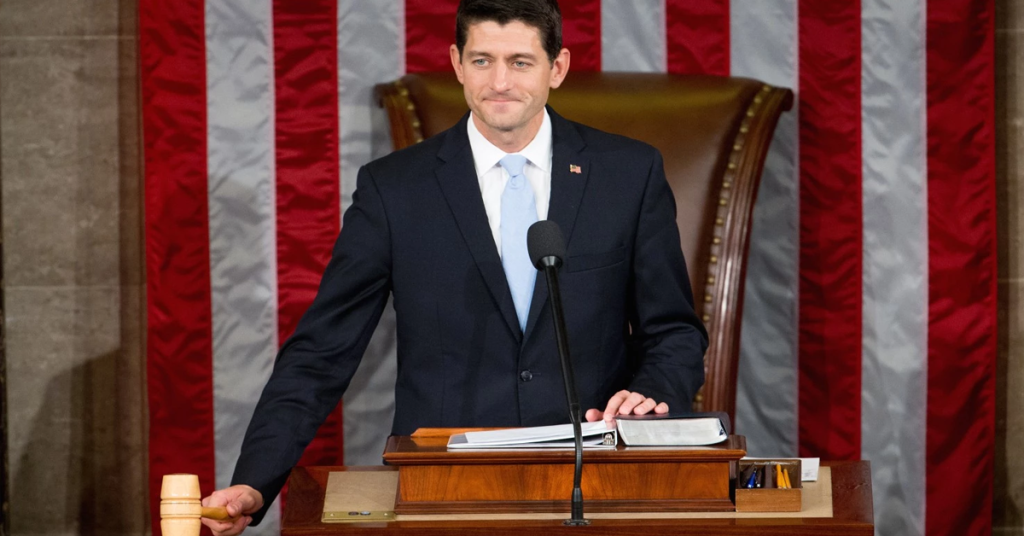
House Speaker Paul Ryan is promising to overhaul the tax code by the end of the year despite political divisions among Republicans and a crowded legislative agenda for Congress. Ryan is due to give a speech on tax reform Tuesday afternoon to the National Association of Manufacturers. In excerpts released by his office, Ryan says Republicans, who control Congress and the White House, have a rare opportunity to re-write the tax code for businesses and individuals. “We are going to get this done in 2017. We need to get this done in 2017. We cannot let this once-in-a-generation moment slip,” Ryan says in prepared remarks. “Transformational tax reform can be done, and we are moving forward. Full speed ahead.” According to Ryan’s office, the Wisconsin Republican will “warn against accepting half measures or believing there is a path to reform without obstacles and political challenges.” That’s an apparent jab at a growing number of Republicans who simply want to cut taxes rather than simplify the tax system and make it more efficient. Ryan’s office says he will make the case for permanent tax reform – rather than a temporary tax cut. The obstacles in Congress are many. Ryan supports a new tax on imports to help finance a lower overall tax rate for corporations, and to encourage U.S. companies to stay in the United States. The tax, however, has no support in the Senate and is vigorously opposed by retailers who worry that it will increase the cost of consumer goods. Ryan’s office said, “He will not litigate the issues currently being resolved between the House, Senate, and (Trump) administration, but he will describe the important components of any reform.” Republicans are planning to pass a tax package under a procedure in which they need only a simple majority in the Senate – preventing Democrats from blocking it. Under the procedure, the tax package cannot add to long-term budget deficits. That means for every tax cut, there has to be a tax increase, at least over the long term. There’s more. In order to take advantage of the procedure, Republicans in the House and Senate must pass a budget resolution. That won’t be easy because there are big disagreements among Republicans over spending levels for the military and for domestic programs. Also, the legislative calendar is crowded with other hard-to-do initiatives. The Senate is currently grappling with how to repeal and replace President Barack Obama‘s health care law. The House already passed a bill but it was not well-received in the Senate. Congress is facing an Oct. 1 deadline to fund the government, and sometime this fall, Congress will have to extend the authority of the federal government to borrow money or risk an unprecedented default. All of these issues are heavy political lifts that will take time and political capital to resolve. Republished with permission of The Associated Press.
Bradley Byrne: The House is working for the American people

Last week in Washington, all eyes were on the Senate Intelligence Committee where former FBI Director James Comey was sent to testify. The hearing was a media circus. News outlets used countdown clocks in the lead up to the “big moment.” Of course it is important to get to the bottom of Russia’s involvement in the 2016 election. That is why committees in Congress and a special counsel are working diligently to get answers. Unfortunately, many think the issue should be litigated in the media instead of through the proper legal process. We should follow the facts and the law and nothing but the facts and the law. What the news media was not talking about last week was our efforts in the House to stick true to our word and enact a commonsense, conservative agenda. We are getting the work done that the American people elected us to do. Consider these numbers: to date the Republican-led House has passed over 158 bills, making us the most productive in the modern era. On top of that, President Trump has signed 37 bills into law, which places him ahead of the last four presidential administrations. We are getting things done. So what exactly are we accomplishing? Everything from passing a bill to repeal and replace Obamacare to enacting a whole range of bills focused on rolling back burdensome regulations that are restricting economic growth. Just this past week we passed a range of bills addressing a range of issues important to the American people, including financial regulations and border security. First, we passed a bill to dismantle the Dodd-Frank law passed by Democrats in 2010. We were promised that the Dodd-Frank Act would be a major win for the American consumer. Instead, big bank bailouts were enshrined in law while small banks and credit unions that people in Southwest Alabama rely upon are drowning in regulations and red tape, making it harder for them to serve their customers and threatening their existence. In fact, studies show that at least one small bank or credit union close each day due to Dodd-Frank. That is why the House passed the Financial CHOICE Act last week, sending a clear message that Main Street comes before Wall Street. The bill officially ends the policy of “too big to fail” and puts a stop to bank bailouts. Just as important, the bill increases consumer protections and simplifies systems to ensure they cannot be gamed by the well-connected and powerful. It is all about increasing opportunities for hardworking Americans and small businesses. Second, we passed the Anti-Border Corruption Reauthorization Act of 2017, which will make it easier to fight illegal immigration and secure the border. Our border protection programs are currently severely understaffed. In fact, the numbers show that we are short 1,000 officers and 1,800 Border Patrol Agents. This shortage is making it harder to secure the border and keep bad guys out of our country. That is where our bill comes it. It will allow us to expedite the hiring of border patrol agents when the individuals have previously served in law enforcement or in the military. These are the exact kind of people we need working to secure the border. As you can see, in the House of Representatives, we refuse to have our agenda thrown off course. Even more, we are continuing to making important progress on other priorities like tax reform, rebuilding the military, and fixing our nation’s infrastructure. I pledge to continue to keep my head down and focus on the issues you elected me to tackle. We must get the job done. • • • Bradley Byrne is a member of U.S. Congress representing Alabama’s 1st Congressional District.
Debt ceiling issue tops summer budget agenda for Congress
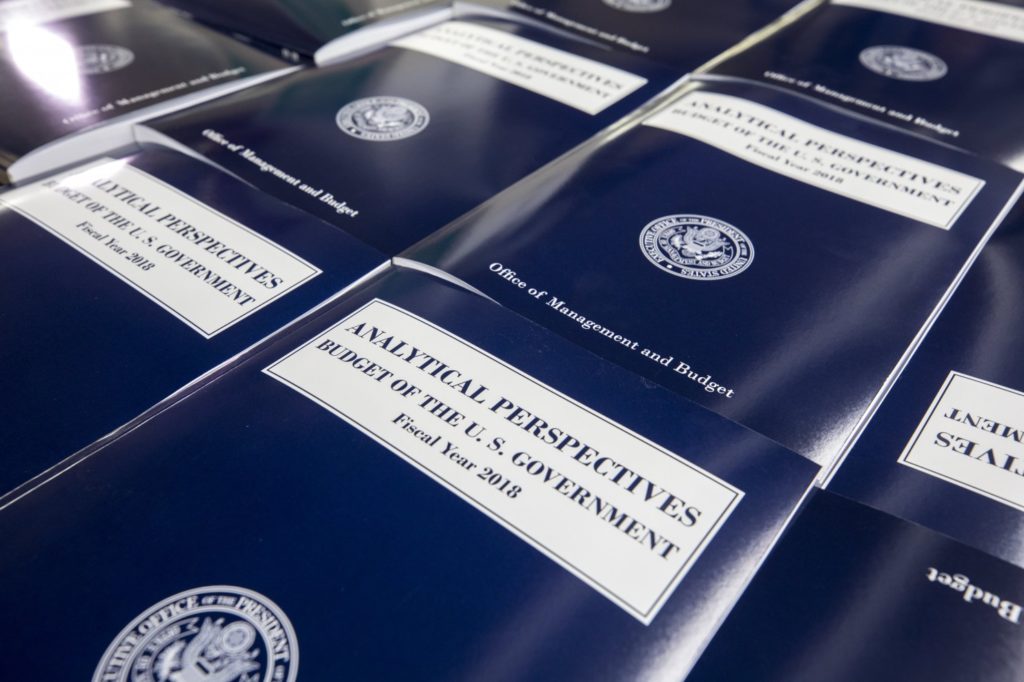
Even members of his own party were quick to declare President Donald Trump‘s budget plan dead on arrival in Congress last month. And in fact, lawmakers are facing a burst of overdue budget-related work this summer. Most of what’s on the budget agenda probably won’t bear much resemblance to Trump’s spending plan, which promised deep spending cuts on domestic programs, rapid economic growth, and a balanced federal ledger in a decade. Instead, they’re confronting an increase in the government’s borrowing cap, serious problems in advancing annual spending bills, and a smaller set of curbs on domestic benefit programs A look at what’s ahead: — DEBT DILEMMA Atop the absolute must-do list is raising the borrowing cap, or debt limit. Doing so would avert a disastrous, first-ever default on U.S. obligations. Treasury Secretary Steven Mnuchin says Congress should vote to raise the debt limit before leaving Washington for its traditional August recess. Lawmakers once thought they had until the fall to act. It would be the first increase of Trump’s presidency, and responsibility for passing it falls chiefly upon the Republicans who control Congress. Some conservatives, including White House budget director Mick Mulvaney and the hard-right House Freedom Caucus, want difficult spending cuts paired with the higher cap. If those efforts fail, it’s commonly assumed that GOP leaders would have to enlist support from Democrats to pass the legislation. Republicans secured sweeping spending cuts as the price for a 2011 debt deal with President Barack Obama. But Obama prevailed in demands for a “clean” debt increase in later rounds, most recently in late 2015. House Democratic leader Nancy Pelosi and other top Democrats say they won’t go along with a debt bill if Republicans press ahead with deficit-financed tax cuts for the wealthy. Mnuchin is using a set of accounting maneuvers to keep the government solvent for now. — SPENDING DEADLOCK Congress is way behind on the 12 annual spending bills covering the Pentagon and other federal agencies for the upcoming 2018 budget year. Work on those measures, totaling more than $1.1 trillion, was supposed to begin last month, but Republicans have yet to even unite behind a plan of attack – much less execute it. GOP leaders and the White House must sort through the demands of numerous competing factions, including defense hawks, defenders of domestic spending, and tea party lawmakers. At the same time, they must deal with Democrats, who retain great leverage because their support is needed to advance the legislation. Trump and his allies generally agree on a big increase for the military, but disagree on corresponding cuts to domestic programs and foreign aid. Democrats are opposed to Trump’s cuts – such as those aimed at the Environmental Protection Agency, foreign aid, grants for first responders, economic development and others – and are pressing for domestic increases. A major battle again looms over money for Trump’s oft-promised wall along the Mexican border. A government shutdown can’t be ruled out when the current budget year end Sept. 30. One option: GOP and Democratic leaders forge the outlines of an overall agreement, then advance the 12 appropriations bills in a bipartisan fashion. It’s a challenging compromise to pull off and would disappoint key factions. So far the result has been drift. Some insiders predict the only solution is yet another bill that covers the entire government in one shot, but it might not pass until late this year and that may put some agencies on autopilot. — BUDGET/TAX IMBROGLIO After health care, the next priority for Republicans is overhauling the tax system. But to do that – at least without turning to Democrats for help – would first require the GOP to pass a blueprint known as a budget resolution. Congress cannot wrap up action on the 2018 plan, however, until efforts to repeal the Obama-era health law are complete. That resolution would allow for follow-up legislation on taxes and spending, including a recommended cap on annual appropriations bills. Republicans are eyeing this course as a way to ease passage of a tax overhaul and cuts to benefit programs such as federal employee pensions and food stamps. But the path ahead is tricky. Some defense stalwarts are demanding Pentagon increases greater than Trump’s, and the White House is pushing lower spending for domestic agency operations. There are accounting tricks used in Trump’s budget, but Republicans cannot resort to using them. That could lead to nonbinding but politically symbolic proposals to cut Medicare, a program Trump says he won’t touch. Republished with permission of The Associated Press.
Donald Trump’s legislative agenda slows to crawl in Congress

President Donald Trump‘s agenda has slowed to a crawl in Congress. Daily distractions and a pair of major controversies in the past week are diverting lawmakers from their day jobs. While the Trump administration delegates many decisions on legislation to more experienced GOP leaders in Congress, Trump’s low poll ratings and the turmoil at the White House are additional complications. The slowing pace was evident even before Tuesday’s explosive story in The New York Times that ousted FBI Director James Comey wrote in a memo that Trump asked him to end an investigation into former national security adviser Michael Flynn. That came 24 hours after The Washington Post revealed that Trump may have disclosed classified information to Russian officials in a meeting in the Oval Office last week. “I think it would be helpful to have less drama emanating from the White House,” said Senate Majority Leader Mitch McConnell, R-Ky. What GOP senators and House members aren’t doing right now is passing major legislation, and it’s not just the marquee items like health care and a tax overhaul that are dragging. The Senate has no legislation on its agenda this week – business is instead limited to three low-profile nominations. The House – fresh off an 11-day recess – is devoting the week to mostly symbolic, feel-good legislation designed to show support for law enforcement. Another 11-day recess, for Memorial Day this time, is just around the corner. Separately, a small group of Senate Republicans is meeting in hopes of finding a way forward on keeping Trump’s promise to repeal and replace the Affordable Care Act. But that effort appears likely to take several weeks – with no guarantee of success. “It’s hard to make things happen here, right? It’s really hard. I mean you’ve got all kinds of forces working against you,” said Sen. Bob Corker, R-Tenn. “And so unless everybody’s aligned, everybody, throughout the White House and the Cabinet, it’s almost impossible. I think they’re all very aware of that and hopefully they’re going to move to address that.” In the meantime, must-do legislation on the military, children’s health and a full slate of spending bills are all slipping behind schedule. Trump’s promised wall along the U.S.-Mexico border is dead in the water after being rejected during negotiations on a catchall spending bill – the only major bipartisan legislation to advance this year – and his promised $1 trillion infrastructure bill is still on the drawing board. Trump’s tax plan is simply a set of talking points and for procedural reasons is on hold until health care is completed. “I don’t think I’ve ever seen an administration that was so lacking in substantive proposals this late in the beginning of their term,” said No. 2 House Democrat Steny Hoyer of Maryland. “The tax bill is a one-page minimal suggestion of what might be considered. There is no jobs bill. There is no infrastructure bill.” And while lawmakers and the Trump administration are spinning their wheels, the clock ticks toward potential crises this fall, as deadlines collide on several measures, including legislation to prevent a government shutdown and a bill to increase the government’s borrowing cap and avert a potentially catastrophic default on U.S. government obligations. A popular program that provides health care to children of parents ineligible for Medicaid expires at the end of September, as does the federal flood insurance program and authorization for the Federal Aviation Administration. Work on a congressional budget measure – which is the linchpin to follow-up legislation to cut tax rates – is months behind schedule. The House and Senate Appropriations panels, typically a swarm of activity at this time of the year, seem stumped as they await marching orders. Trump’s budget finally arrives next week, promising a balanced federal ledger within 10 years. But the Trump budget could complicate matters more, in large part because it calls for domestic cuts that lawmakers have no interest in. Trump doesn’t appear very interested in the budget – its release has been scheduled for when he’s out of the country – and its promise of balance rests on rosy assumptions of economic growth and a sweeping round of unrealistic cuts to programs like Medicaid. The GOP-controlled Congress has had just a handful of legislative successes since it convened in January. The most significant bill, so far, was a long-delayed House health care measure that squeaked through earlier this month. The House bill polls poorly with voters, however, and faces a wholesale rewrite in the Senate. So far, just a single piece of major legislation has advanced that required the votes of Democrats – a catchall $1.1 trillion spending bill opposed by more than 100 House Republicans. Beyond that, many of the bills Trump has signed into law were fast-track measures to rescind regulations issued by former President Barack Obama last year. The clock ran out on further repeals and this week, the biggest Senate vote is on confirming Iowa GOP Gov. Terry Branstad as ambassador to China. “Well, we have nominations and we’ve repealed billions of dollars of regulations,” said Sen. Cory Gardner, R-Colo. “Hopefully we’ll see some other action come to the floor.” Republished with permission of The Associated Press.
Short of support, House won’t vote on health bill this week
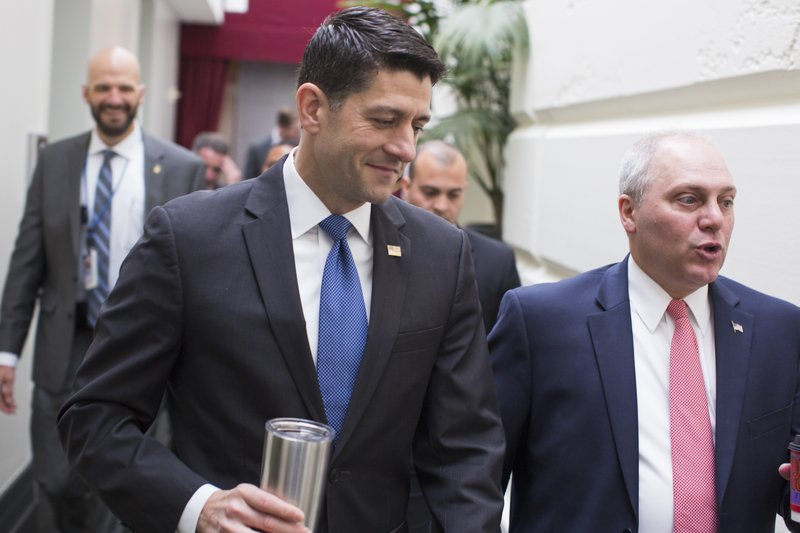
The House won’t vote on Republican legislation scuttling much of President Barack Obama‘s health care law until at least next week, a GOP leader said Thursday. The decision deals a setback to the White House, which has pressured congressional Republicans to pass the bill by Saturday — President Donald Trump‘s 100th day in office. “As soon as we have the votes, we’ll vote on it,” House Majority Leader Kevin McCarthy, R-Calif., told reporters late Thursday after leaving a meeting of the House GOP leadership that lasted nearly two hours. He said the vote would not occur Friday or Saturday. White House and Republican leaders had labored all day to wring votes out of resistant moderate GOP lawmakers for the health care measure. But they remained shy of the support they’d need to fully rouse the measure back to life, and it was uncertain when the vote would occur. Centrist Republicans were the primary target of the lobbying, a day after the conservative House Freedom Caucus announced its support for a revised version of the legislation. The fresh backing from that group exhumed the bill from the legislative graveyard, but leaders need moderates who’ve resisted the effort to jump aboard. While the White House was eager for a vote this week, Speaker Paul Ryan, R-Wis., wants to avoid an encore of last month’s embarrassment on the bill. He had to abruptly cancel a vote on an initial version of the bill because of opposition from moderates and conservatives alike. Ryan told reporters that leaders were making progress but added, “We’re going to go when we have the votes.” He noted that he had spoken earlier this year about a 200-day legislative plan because of the complexity of revamping the nation’s health system, its tax code and border security. In at least one instance, Trump and Vice President Mike Pence spoke to one recalcitrant conservative who is now a yes vote. Rep. Mo Brooks, R-Ala., said he’d already decided to switch to backing the revamped bill on Wednesday before he got two phone calls from Pence, who on the second call handed the phone to Trump. “Donald Trump expressed his appreciation for the position I was taking,” Brooks said Thursday. “That gives you a good feeling inside about what you’re doing.” The recast bill would let states escape a requirement under former President Barack Obama’s health care law that insurers charge healthy and seriously ill customers the same rates. They could also be exempted from Obama’s mandate that insurers cover a list of services like maternity care, and from its bar against charging older customers more than triple their rates for younger ones. Overall, the legislation would cut the Medicaid program for the poor, eliminate Obama’s fines for people who don’t buy insurance and provide generally skimpier subsidies. Democrats remained solidly against the legislation, which they said would make health care coverage less available and costlier. House Minority Leader Nancy Pelosi, D-Calif., told reporters that for Republicans, voting for the bill “is going to be doo-doo stuck to their shoe for a long time.” Conservatives embraced the revisions as a way to lower people’s health care expenses. Moderates saw them as diminishing coverage because insurers could make policies for their most ill — and expensive — customers too costly for them to afford. “No bill is going to solve every issue,” said Rep. Tom MacArthur, R-N.J., who crafted the newest edition of the legislation with Rep. Mark Meadows, R-N.C., who heads the hard-line Freedom Caucus. MacArthur is a leader of the roughly 50-member moderate House Tuesday Group, but it is unclear that he has won over many of their votes and he conceded that some lawmakers “are struggling to get to yes.” Two moderate Pennsylvania Republicans affirmed Thursday they would vote no — Reps. Patrick Meehan, who’d been publicly undeclared, and Ryan Costello, who’d said he’d have opposed the original bill. Both cited fears that the new bill would leave people with serious illnesses unprotected. Meehan said he was called recently by Pence and lobbied “by everyone in leadership.” The American Medical Association said it opposed the newly reshaped bill, as it did the original legislation. The doctors’ group said letting insurers boost premiums on people with pre-existing conditions “will likely lead to patients losing their coverage.” Some lawmakers and GOP aides suggested leaders were less than 10 away from the 216 votes Republicans will need to prevail. Republished with permission of The Associated Press.


